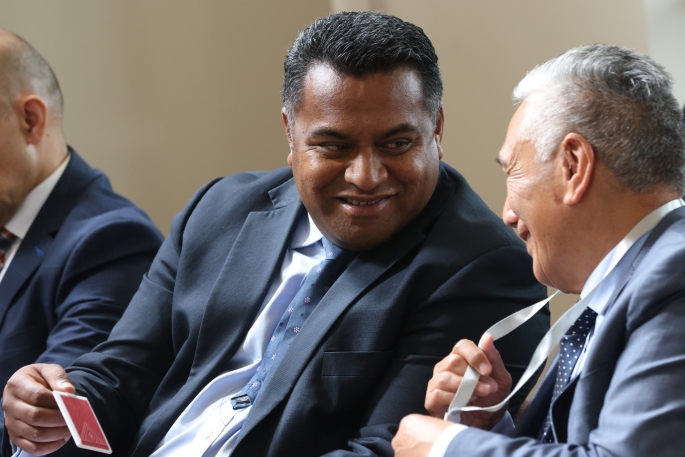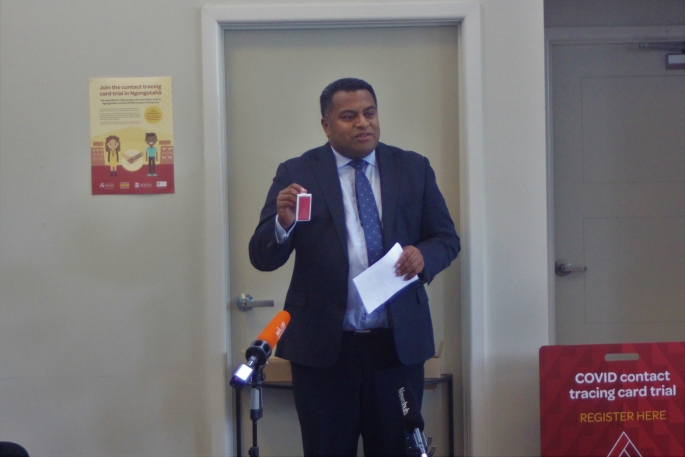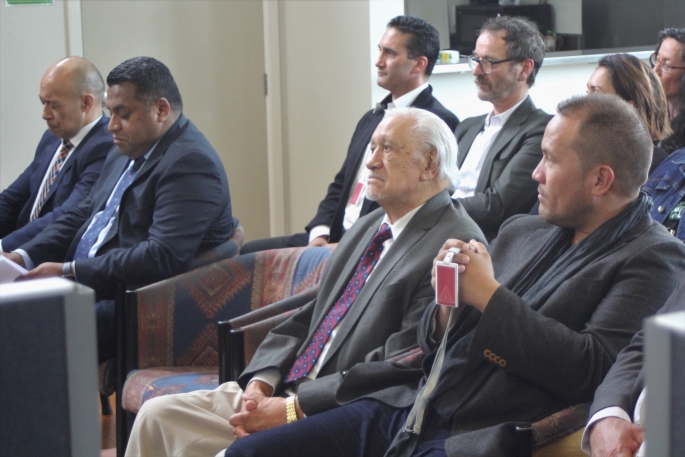The Rotorua suburb of Ngongotaha has been chosen to trial new Covid-19 tracing technology with locals being called on to help test the Bluetooth contact tracing cards.
The 'on-the-ground” phase of a community-based trial for a Covid-19 contact tracing card was officially launched in Ngongotaha by Minister for Government Digital Services, Kris Faafoi and Te Arawa Covid-19 Response hub kaumatua Sir Toby Curtis and Monty Morrison this morning.
Between 500 and 1500 people are being asked to volunteer for the trial which will involve them wearing the card for a week and providing their feedback on the experience.
Participants will need to be over 19 years of age and live or work in Ngongotaha.
They can sign up for the trial at various locations around the village from tomorrow until Sunday, November 8, with the trial running from November 9 to November 16.
Co-designed by Te Arawa Covid Hub, the Ministry of Health and the Universities of Otago and Waikato, the trial's purpose is to understand how the Bluetooth-enabled contact tracing card works in the real world, whether it is compatible with New Zealand's contact tracing systems and if people will accept and use them.
Ngongotaha was selected as the location for the trial because of its compact size and is relatively isolated in terms of geography.
Other factors were that many people who live in the area also work in the area and that it is large enough to have several marae, a school, supermarket, cafe, pubs and community facilities, but small enough that the trial will involve a significant proportion of the population, around 40 per cent of whom are Māori.
Ta Toby Curtis and MP Tamati Coffey (holding tracing card) were at this morning's launch. Photo/Matt Martin
'On behalf of Government, I acknowledge the commitment of the Ngongotaha community and local leaders to deliver this trial,” says Minister Faafoi.
'Their support and leadership of this trial will provide important help for the Government to decide if a card could be rolled out as an additional contact tracing option to benefit all of Aotearoa/New Zealand.”
Importantly, Te Arawa believes a contact tracing card could be a critical addition to the pandemic toolbox to help protect vulnerable whānau from Covid-19.
Te Arawa Covid-19 Response Hub spokesperson, Monty Morrison says the trial will help determine whether a contact tracing card is a more equitable, and therefore effective, contact-tracing solution for vulnerable communities.

The Covid-19 contact tracing card. Photo/Supplied
'Tragically, we already know from experience that Māori are estimated to be 50 per cent more likely to die from Covid-19 than non-Māori.
'Effective and efficient contact tracing could literally mean the difference between life and death for some of our whānau and we need to ensure we have the ability to identify potential contacts and reach and isolate people quickly," Monty says.
He says many older people do not own smartphones and large numbers of local whānau have older phones that do not support the government's contact tracing app.
The contact tracing card can be worn on a lanyard or clipped to the wearer's belt.
It exchanges signals with anyone nearby who is also wearing a card in what can be described as 'a digital handshake”.
The contact tracing card is not capable of tracking the wearer's location or identity and the information is fully contained and protected on each card.
Its primary function is to build a memory of contacts so the wearer can be quickly alerted if they have been in close contact with someone who has tested positive for Covid-19.
'There are no barriers to using a contact tracing card so it could be a critical tool for protecting our whānau, particularly our vulnerable kaumatua,” Monty says.
'The work that we do now – in Ngongotaha – could make a meaningful difference for vulnerable communities and New Zealanders across the country.

Minister Kris Faafoi and Te Arawa kaumatua Monty Morrison (right). Photo/Stephen Parker
"We hope people will sign up to be involved – they will genuinely be doing their bit to help Aotearoa in its fight against Covid-19.
New Zealand Deputy Director-General of Health, Shayne Hunter believes a contact tracing card is one of the technologies that has the potential to help New Zealand with contact tracing.
'Covid-19 is evolving and not going away – we must explore all options to protect our communities here in Aotearoa and to prevent the need for further lockdowns,” says Shayne.
He says the Ministry of Health is pleased Te Arawa has agreed to be involved in the trial.
'Te Arawa knows the Ngongotaha community better than anyone and has all the skills and experience needed to support a successful trial from beginning to end,” he says.




0 comments
Leave a Comment
You must be logged in to make a comment.